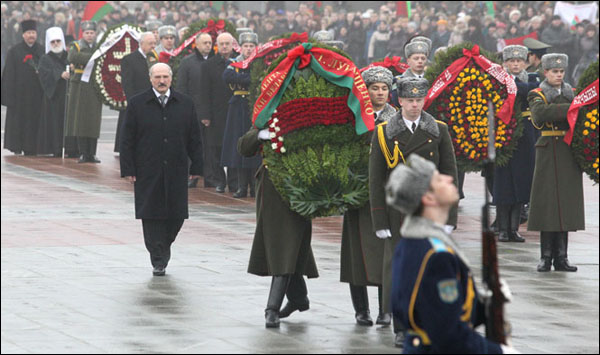
Why There Will Be No Ukraine-Like Crisis in Belarus
Publication: Eurasia Daily Monitor Volume: 11 Issue: 38
By:

A flurry of publications and public statements comparing and contrasting Belarus and Ukraine (see EDM, February 18) continues. On February 23, Belarus celebrated the Day of the Homeland’s Defender, a national holiday inherited from the Soviet Union. In his holiday speech, President Alyaksandr Lukashenka stated that “there will be no Maidan in our country.” And yet on the same day, while communicating with a crowd of Minsk residents after a wreath-laying ceremony at Victory Square, he also mentioned that “as you know, I am still friends with the very first Maidan leaders such as Viktor Yushchenko [Ukrainian president from 2005 to 2010, who was elected following the Orange Revolution]” (https://naviny.by/rubrics/politic/2014/02/23/ic_articles_112_184688/).
Both opposition-minded and government-friendly commentators stress that Belarus is an unlikely place to replicate the Ukrainian crisis. According to Alexander Klaskovsky, representing the opposition, this can be attributed to several factors. First, Belarusian law enforcement personnel are of high quality. And they would effectively preempt the active stage of protest by singling out and isolating the potential leaders. Second, there is only one oligarch in Belarus—implying Lukashenka. Third, quality of life in Belarus is higher than in Ukraine. Fourth, even if the Belarusian state deteriorates, it is likely that Russia, and not the West, will gain ground in the country. Fifth, unlike the Ukrainian national character, that of the Belarusians does not draw from the Cossack freeman tradition. Klaskovsky also thinks that the probable Western drift of post-Maidan Ukraine benefits Minsk. It is likely that, in response, Moscow will show even more financial generosity toward Belarus in view of the now enhanced value of Belarusian transit (as opposed to Ukrainian) of Russia’s hydrocarbon exports. Also, the pandemonium in Ukraine is a boon for official Belarusian propaganda; the bloodshed in Kyiv can be easily attributed to a lack of stability—a mantra of the political establishment in Minsk—as well as to a rapacious oligarchy and rampant corruption (https://naviny.by/rubrics/politic/2014/02/19/ic_articles_112_184655/).
A somewhat different analysis of the Ukrainian crisis was published by Alexander Shpakovsky (https://www.regnum.ru/news/1770385.htmls), who is affiliated with the Cytadel project, which views Belarus as a sovereign country yet integral to the Russian world. According to Shpakovsky, the Ukrainian oligarchy is the root cause of the crisis, and Ukraine’s cultural divide has exacerbated the situation. Ukrainian business groups have not developed a mechanism for a lasting consensus. Each of those groups keeps not only the members of the Ukrainian parliament on its payroll but also pays a second salary to government officials. Shpakovsky’s most revealing point is that a “good” government is sustained by two instruments—a broad, unifying national idea and an acceptable social contract with the citizenry. A “not-so-good” government focuses on only one of those tools—almost definitely an allusion to Belarus, where a broad, unifying national idea is missing. The Ukrainian government, however, went further by not resorting to either of these state-building instruments. The only product offered by the oligarchy to the common people has been a certain image of the “Ukrainian dream.” Multiple political operators and PR specialists work on propagating it. For quite some time, the Ukrainian dream used to be European integration peddled as a universal master key to all problems—particularly poverty. Euro-integration failed, however, due to an inadequate assessment of the actual role of Russia in the Ukrainian economy and due to an objective cultural divide. The eastern and southern regions of Ukraine, culturally leaning toward Russia, were not quite mobilized by the idea of European integration because they lack a fervent Ukrainian nationalism enmeshed with anti-Russian sentiment. According to Shpakovsky, it is the Ukrainian west and its support by the European Union and the United States that gained the upper hand in the information war in Kyiv. Shpakovsky warns Minsk against being drawn into the Ukrainian conflict by either of its sides and against offering refuge to Viktor Yanukovych’s associates. It was indeed reported that Belarus denied asylum to Ukraine’s former minister of interior Vitaly Zakharchenka (https://hvylya.org/news/exclusive/belarus-potrebovala-ot-zaharchenko-i-kurchenko-do-18-00-pokinut-territoriyu-stranyi.html). Shpakovsky insists that the border with Ukraine should be closely monitored so that neither weaponry nor criminal or terrorist elements be allowed into Belarus.
Although it is clear that the Belarusian equivalent of the Ukrainian cultural divide lacks a regional dimension (whereby two contiguous blocks of regions are set against each other), it nevertheless shows up within the city of Minsk where most, if not all, Belarusian liberals and Westernizers reside. A somewhat awkward, if not comical, expression of that divide was made apparent during the Sochi Winter Olympics, where Belarusian sportsmen turned out to be the fifth most decorated group, earning five gold medals and one bronze. According to Klaskovsky, whose article is titled “Is Olympic gold an achievement of Lukashenka or that of Belarus?” (https://naviny.by/rubrics/politic/2014/02/18/ic_articles_112_184626/), the Sochi triumph caused a fierce debate on social networks. Journalist Zmitser Galko wrote on his Facebook page that “whatever pleases Lukashenka and allows him to demonstrate his, as it were, success cannot please me.” “If one drives this argument to a logical extreme,” responded Vital Tsygankow of Radio Liberty, “one cannot be pleased by sunrise and good weather because these same things can also delight Lukashenka.” According to Tsygankow, a phenomenon of psychological dependency of opposition-minded Belarusians on Lukashenka is morbid. To them, he is a kind of anti-Midas: Anything he touches transforms into deleterious filth. “What if, out of some kind of fear, Lukashenka recognizes the white-red-white flag of Belarus [i.e., the flag that the opposition champions],” exclaims Tsygankow. “We would immediately read on the social networks that this flag cannot be loved anymore because it was endorsed by Lukashenka” (nn.by/?c=ar&i=122648?).
To the opposition’s chagrin, however, Darya Domracheva, who in Sochi won three gold medals in the biathlon, said that she “defended the red-green flag of Belarus and it is this flag that is raised when I am on top of the podium.” She added, though, that “sport should stay away from politics” (gazetaby.com/cont/art.php?sn_nid=70072).
According to a rhymed English equivalent of a Russian saying, any bauble of folly will keep baby jolly. Indeed, as long as the Belarusian opposition remains preoccupied with such issues that have little resonance among the majority of the Belarusian population, no semblance of the Ukrainian Maidan will befall Belarus.




